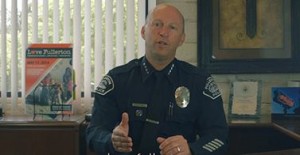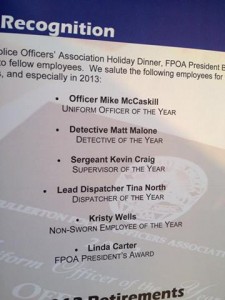I REPORT, YOU DECIDE.-by Barry Levinson
I attended the Fullerton Republican Women’s Federated meeting on May 28, 2014. The guest speaker was our Police Chief Dan Hughes. He gave an interesting if somewhat disjointed speech. He indicated that it was good for his department to acknowledge when they do not live up to the highest standards. Yet, he then referred to activists and complained that whatever the FPD actually does, these activists are going to complain about his department.
Dan, either you want legitimate criticism or you want to bitterly complain whenever a member of the public has a legitimate beef with the FPD. Your speech certainly sent out mixed messages much like that famous pair, Dr. Jekyll and Mr. Hyde.
He also handed out the 2013 FPD Annual Report, which he indicated was the first one published since way back in 1967.
In it I noted that for 2013, the FPD Supervisor of the Year was none other than Sergeant Kevin Craig, the highest-ranking officer present during the beating death of Kelly Thomas. Craig, you may recall, testified in late 2013 or January 2014 for the defense of Ramos and Cicinelli, claiming that none of the actions taken by any of his fellow officers, including himself that night were indeed against FPD policy. It seemed rather odd that even before the criminal trial had begun, Dan Hughes chose this man to be his star performer.
Why, Dan, did you fire Ramos, Cicinelli and Wolfe, when your Supervisor of the Year testified that they did nothing wrong? Your training officer, Corporal Rubio also testified that they did absolutely nothing wrong.
I guess those officers were just walking by and Kelly Thomas just happened to repeatedly strike himself in the head, face, body, etc. and died. I guess Kelly Thomas asked Fullerton Police Officer, Jay Cincinelli if he could borrow his taser, so Kelly could inflict maximum damage to his own face. I guess it was just those 6 officers’ misfortune that they happened to be on their normal rounds when that terrible incident occurred.
One must accept the above scenario as the truth to be able to understand why not one of those 6 officers ever spent a night in jail. But those pesky activists — you know, the protestors — Dan Hughes will make darn sure that they spend some time behind bars. Because that is the fair-minded, not-politically-motivated police chief we are so lucky to have represent us in the most ethically run city in the state of California. Count your blessings, Fullertonians. The city of Bell has nothing over us. After all, they just stole money, not a life!
I forgot to tell all of you, that our police chief kept on repeating one point over and over again during his presentation. That point was that Dan Hughes just does not pay any attention to the politics within Fullerton. No, he just sends 6 police officers, including 2 supervisors as well as several police vehicles to Pasadena for half a day to arrest AJ for a misdemeanor failure to disperse.
I now have learned from Jean Thaxton’s public comments at last council meeting that Dan Hughes put together a police committee to review the tape of the Ramos, Cicinelli not guilty protest that took place on January 18, 2014. Based on that review, FPD filed that non-violent misdemeanor charge against peaceful protester and live streamer, AJ Redkey for failure to disperse (failure I guess to not disperse quickly enough for Dan Hughes because others have alleged that the same tape shows Mr. Redkey running from the protest area at the time the police asked the protestors to disperse). We all know that had to be the highest priority for our FPD that day. Clearly, if AJ Redkey was the most dangerous “suspect” that needed to be arrested that day 40 miles away in Pasadena, and you could afford to send 6 officers to make that arrest, then I would humbly point out that the FPD is greatly overstaffed!
By the way, it is my understanding that the most common way, the easiest way and probably the cheapest way to make that arrest was to call the Pasadena Police Department and ask them to make that arrest. I guess that easy solution never crossed your mind, Chief Hughes. I guess the next question is why did that simple and easy solution never cross your mind? Or maybe it was personal to you Dan Hughes, like the game of political payback! Just like the reports that the FPD riot police who taunted those protestors who were arrested on January 18th, 2014 with saying the words Not Guilty over and over again! If true, it shows a great lack of maturity and professionalism by those officers.
But unfortunately for the good people of Fullerton, the alleged bad acts of one or more Fullerton police officers do not end there. In fact, it was reported that those 10 arrested protestors complained that their very lives were threatened by at least one Fullerton police officer who was transporting them to jail. These protestors complained that they were threatened that when they arrived at the Orange County jail all their faces (including both men and women) will be smashed in by 12 waiting OC Sheriff Deputies. Yet when Dan Hughes was asked whether he had reviewed the DAR’s (Digital Audio Recorder’s) of those officers to investigate those extremely serious charges, our open and honest police chief remained totally silent.
PS: It is now over a month and counting when I first asked Dan Hughes to tell me the name of the Officer who replaced Reserve Officer Bill Wallis performing the very important role of monitoring and enforcing Fullerton’s Sex Offender population. I am becoming suspicious that Dan has not and maybe does not want to hire a replacement for Bill Wallis. That would certainly have the same or greater chilling effect as repealing our Ordinance No. 3149. No manpower, no enforcement, no protection for both our children and our women from dangerous sexual predators.
Barry Levinson








#1 by Danny Boy are you in? on June 21, 2014 - 12:36 am
WASHINGTON
U.S. pushing local cops to stay mum on cellular surveillance
THU, 06/12/2014 – 1:37PM
SUN-TIMES WIRES
@SUNTIMES | EMAIL
WASHINGTON — The Obama administration has been quietly advising local police not to disclose details about surveillance technology they are using to sweep up basic cellphone data from entire neighborhoods, The Associated Press has learned.
Citing security reasons, the U.S. has intervened in routine state public records cases and criminal trials regarding use of the technology. This has resulted in police departments withholding materials or heavily censoring documents in rare instances when they disclose any about the purchase and use of such powerful surveillance equipment.
Federal involvement in local open records proceedings is unusual. It comes at a time when President Barack Obama has said he welcomes a debate on government surveillance and called for more transparency about spying in the wake of disclosures about classified federal surveillance programs.
Lawsuit seeks details on Chicago Police purchases of cellular tracking gear
One well-known type of this surveillance equipment is known as a Stingray, an innovative way for law enforcement to track cellphones used by suspects and gather evidence. The equipment tricks cellphones into identifying their owners’ account information and transmitting data to police as if it were a phone company’s tower. That allows police to obtain cellphone information without having to ask for help from service providers, such as Verizon or AT&T, and can locate a phone without the user even making a call or sending a text message.
But without more details about how the technology works and under what circumstances it’s used, it’s unclear whether the technology might violate a person’s constitutional rights or whether it’s a good investment of taxpayer dollars.
Interviews, court records and public-records requests show the Obama administration is asking agencies to withhold common information about the equipment, such as how the technology is used and how to turn it on. That pushback has come in the form of FBI affidavits and consultation in local criminal cases.
“These extreme secrecy efforts are in relation to very controversial, local government surveillance practices using highly invasive technology,” said Nathan Freed Wessler, a staff attorney with the American Civil Liberties Union, which has fought for the release of these types of records. “If public participation means anything, people should have the facts about what the government is doing to them.”
Harris Corp., a key manufacturer of this equipment, built a secrecy element into its authorization agreement with the Federal Communications Commission in 2011. That authorization has an unusual requirement: that local law enforcement “coordinate with the FBI the acquisition and use of the equipment.” Companies like Harris need FCC authorization in order to sell wireless equipment that could interfere with radio frequencies.
A spokesman from Harris Corp. said the company will not discuss its products for the Defense Department and law enforcement agencies, although public filings showed government sales of communications systems such as the Stingray accounted for nearly one-third of its $5 billion in revenue. “As a government contractor, our solutions are regulated and their use is restricted,” spokesman Jim Burke said.
Local police agencies have been denying access to records about this surveillance equipment under state public records laws. Agencies in San Diego, Chicago and Oakland County, Michigan, for instance, declined to tell the AP what devices they purchased, how much they cost and with whom they shared information. San Diego police released a heavily censored purchasing document. Oakland officials said police-secrecy exemptions and attorney-client privilege keep their hands tied. It was unclear whether the Obama administration interfered in the AP requests.
“It’s troubling to think the FBI can just trump the state’s open records law,” said Ginger McCall, director of the open government project at the Electronic Privacy Information Center. McCall suspects the surveillance would not pass constitutional muster.
“The vast amount of information it sweeps in is totally irrelevant to the investigation,” she said.
A court case challenging the public release of information from the Tucson Police Department includes an affidavit from an FBI special agent, Bradley Morrison, who said the disclosure would “result in the FBI’s inability to protect the public from terrorism and other criminal activity because through public disclosures, this technology has been rendered essentially useless for future investigations.”
Morrison said revealing any information about the technology would violate a federal homeland security law about information-sharing and arms-control laws — legal arguments that that outside lawyers and transparency experts said are specious and don’t comport with court cases on the U.S. Freedom of Information Act.
The FBI did not answer questions about its role in states’ open records proceedings.
But a former Justice Department official said the federal government should be making this argument in federal court, not a state level where different public records laws apply.
“The federal government appears to be attempting to assert a federal interest in the information being sought, but it’s going about it the wrong way,” said Dan Metcalfe, the former director of the Justice Department’s office of information and privacy. Currently Metcalfe is the executive director of American University’s law school Collaboration on Government Secrecy project.
A criminal case in Tallahassee cites the same homeland security laws in Morrison’s affidavit, court records show, and prosecutors told the court they consulted with the FBI to keep portions of a transcript sealed. That transcript, released earlier this month, revealed that Stingrays “force” cellphones to register their location and identifying information with the police device and enables officers to track calls whenever the phone is on.
One law enforcement official familiar with the Tucson lawsuit, who spoke on condition of anonymity because the official was not authorized to speak about internal discussions, said federal lawyers told Tucson police they couldn’t hand over a PowerPoint presentation made by local officers about how to operate the Stingray device. Federal officials forwarded Morrison’s affidavit for use in the Tucson police department’s reply to the lawsuit, rather than requesting the case be moved to federal court.
In Sarasota, Florida, the U.S. Marshals Service confiscated local records on the use of the surveillance equipment, removing the documents from the reach of Florida’s expansive open-records law after the ACLU asked under Florida law to see the documents. The ACLU has asked a judge to intervene. The Marshals Service said it deputized the officer as a federal agent and therefore the records weren’t accessible under Florida law.
JACK GILLUM AND EILEEN SULLIVAN, Associated Press
Associated Press writer Brendan Farrington in Tallahassee, Florida, contributed to this report.
OBAMA ADMINISTRATION SURVEILLANCE
politics.suntimes.com
politics.suntimes.com
#2 by Fullerton Lover on February 25, 2016 - 10:54 am
…not really too much of a stretch, or above the scope of reality, that Fullerton PD would be “borrowing” Anaheim PD’s Stingray cell phone interceptor to intercept their political opponent’s texts, calls, cell phone data, GPS location, etc…
The ACLU needs to tap Fullerton on the shoulder to ensure compliance that these are only used by the police with a warrant from a Judge.
http://www.ocregister.com/articles/law-705644-anaheim-police.html?utm_campaign=OCR+Top+Stories+Curated&utm_source=hs_email&utm_medium=email&utm_content=26650675&_hsenc=p2ANqtz-86UAUtywcIK7TlKTTcWr-aPP6IPsRDdeClaNEdlOAbONJyTiqB1VNvhhYQl0cvEkQs6ugbClFMksKRtw9k953CzcEuzA&_hsmi=26650675